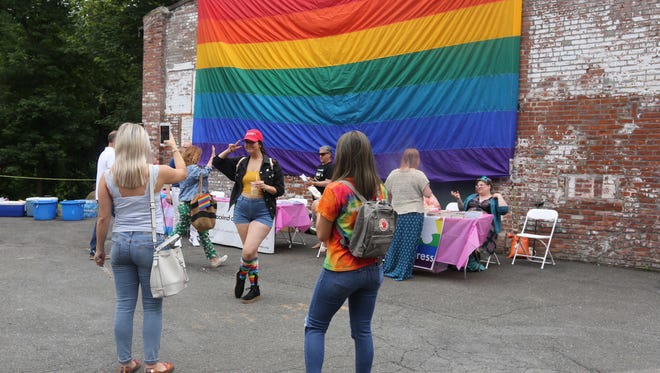Mark E. Geller and Loren Klein
There are not enough local healthcare providers who provide the full spectrum of health and wellness needs for Lesbian, Gay, Bisexual, Transgender, and Queer (LGBTQ+) patients. This unmet need is widening an already dangerous health equity gap. With limited local providers to address these needs, approximately 24% of LGBTQ+ people travel outside of Rockland County for primary and specialty medical care that is safe and affirming for them as LGBTQ+ people. Transportation barriers often prevent LGBTQ+ people from receiving the essential healthcare they need and deserve.
The Rockland Pride Center, located in Nyack, sees the impact of this lack of access every day. We work with Gay adults living with HIV who travel to New York City to visit their trusted providers. Transgender and Non-Binary people often travel to LGBTQ+ specific healthcare centers because few providers in Rockland provide gender affirmation services. LGBTQ+ parents tell us that they often have to educate their children’s pediatricians who assume their child has a mother and a father instead of two mothers or two fathers. Many segments of the LGBTQ+ community report they avoid visiting a doctor for fear of being treated with confusion or even open hostility.
Montefiore Nyack Hospital partnered with Rockland Pride several years ago to address these disparities. It began a journey to create a safe and inclusive environment and provide much-needed supportive healthcare to our community’s LGBTQ+ members. As the County’s largest health care provider, Montefiore Nyack Hospital is committed to closing these health equity gaps and improving healthcare outcomes for LGBTQ+ individuals as part of a more significant commitment to a healthier Rockland County.
Federally funded research has shown five areas of significant risk for LGBTQ+ persons, including cancer, immunization, infectious diseases, mental health, HIV/AIDS, and family planning. Studies have shown that Lesbian adults are less likely to get preventative cancer screenings for fear of discrimination, lack of insurance, and past negative experiences with health care providers. Similarly, Gay adults are at higher risk of sexually transmitted infections. The fear of prejudice creates a barrier to seeking medical care, which inevitably leads to poorer health outcomes.

The need for mental health services is supported by data that clearly shows members of the LGB/Q+ community are twice as likely to experience a mental health condition, such as anxiety and depression. Transgender individuals are four times as likely compared to their cisgender counterparts. The problem is magnified for Transgender youth, 40% of whom attempt suicide as a result of rejection, social isolation, and violence.
There is also an increased homelessness rate for LGBTQ+ individuals, often related to family rejection or workplace discrimination. Health-related issues for these individuals are further impacted by food insecurity, lack of safe living arrangements, and under-insurance.
The psychological effect of the COVID-19 pandemic has especially complicated health-related issues for members of the LGBTQ+ community. Many older LGBTQ+ people are single, four times less likely to have children, and are often estranged from their families. Stay-at-home orders exacerbate already present feelings of isolation and loneliness and have the ability to compound underlying mental health conditions. The pandemic has further underscored the need to engage more effectively with the LGBTQ+ community by listening to their concerns and working with LGBTQ+ sensitive community partners to dispel myths, promote trauma-informed conversations and build trust.
Access to healthcare is an essential and fundamental right for all citizens. However, for members of the LGBTQ+ community, there is a barrier to access when healthcare is perceived as not safe or affirming. For the LGBTQ+ community achieving optimal equitable healthcare and wellbeing can only be achieved by having relationships with primary, specialty, and critical care providers in a setting where a patient’s sexual orientation and gender identity can be openly and safely expressed.
There is much more to be done, and this will require increased awareness, education, and offerings from local healthcare and human service providers and the greater community. An investment in LGBTQ+ healthcare is an investment in a healthier, more equitable Rockland County.
Mark E. Geller, MD, is president and CEO of Montefiore Nyack Hospital. Loren Klein is coordinator of Transgender & Non-Binary Services at the Phyllis B. Frank Pride Center of Rockland County








